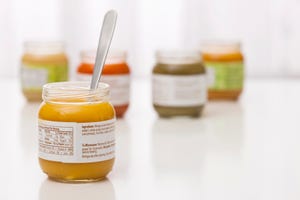
FDA Recommends New Guidelines for Lead in Baby Food - CNET
The US Food and Drug Administration is proposing new guidelines to reduce the amount of lead in baby food, the agency announced on Tuesday. The draft guidance is part of the organization’s wider efforts to lower exposure to contaminants like arsenic, cadmium, mercury and lead in foods that babies and young children consume.
The FDA recognizes that lead cannot be totally eliminated from soil or the environment, but its intention is to set regulations for foods packaged in jars, pouches, boxes and tubs. By following its guidance, the agency believes it would result in a 24% to 27% reduction in lead exposure. The limitations would apply to foods meant for babies and children under age 2. According to the proposal — which is aimed at food manufacturers — the recommended action plan would limit the amount of lead to the following:
- 10 parts per billion for fruits, vegetables (excluding single-ingredient root vegetables), mixtures, yogurts, custards/puddings and single-ingredient meats
- 20 parts per billion for root vegetables (single ingredient)
- 20 parts per billion for dry cereals
The agency said that the guidance is not meant to be used by consumers to make buying decisions. Rather, the FDA urges parents to continue feeding their children nutritious foods from all the main food groups, regardless of whether they are processed or prepackaged.
The information contained in this article is for educational and informational purposes only and is not intended as health or medical advice. Always consult a physician or other qualified health provider regarding any questions you may have about a medical condition or health objectives.

